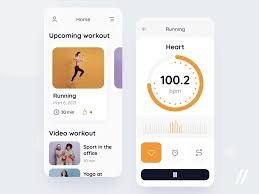
Technology is rewriting the rulebook of health and wellness. No longer limited to gym memberships and generic routines, the fitness world is entering a new era—led by Artificial Intelligence (AI) and the Internet of Things (IoT). These technologies are fueling an unprecedented wave of innovation in smart fitness apps, reshaping how we approach physical activity, wellness tracking, and personal health goals.
At the heart of this digital transformation is the modern Fitness App Development Company, which blends engineering, data science, and user-centric design to create experiences that adapt, learn, and improve over time.
How AI Is Enhancing Personal Health Journeys
AI has emerged as a critical force in customizing fitness routines and wellness plans. Traditional health apps often rely on static algorithms or limited input. AI, on the other hand, uses machine learning to analyze large volumes of data—from user behavior to environmental factors—to make predictions and adjust routines accordingly.
A fitness app might, for example, analyze your sleep patterns, step count, and mood logs to recommend the best time for a workout. It can also track your consistency and challenge you when it senses you’re ready for more, just like a real-life personal trainer. This kind of intelligent feedback not only improves fitness outcomes but also keeps users motivated.
IoT: Bridging the Gap Between Devices and Real-Time Action
While AI handles the brains behind the operation, IoT supplies the eyes and ears. IoT refers to a network of interconnected devices—like smartwatches, heart rate monitors, smart scales, and even smart shoes—that collect real-time data about the user’s activity, health metrics, and environment.
When these devices sync with a smart fitness app, they create a seamless feedback loop. Your wearable might record your heart rate and send it to the app, which, using AI, evaluates whether your cardio session hit the right zone. It might even suggest a cooldown if you’ve pushed too hard, or stretch routines if your motion sensors detect muscle stiffness.
Together, AI and IoT provide a real-time, hyper-personalized fitness experience.
Smarter Diet and Nutrition Management
Smart fitness apps are no longer just about exercise. With advancements in AI, many now offer customized meal planning, calorie tracking, and hydration reminders. Some even scan barcodes or integrate with kitchen devices to help monitor nutrient intake.
When paired with IoT sensors like smart water bottles or connected kitchen scales, these apps can measure actual consumption and use that data to refine dietary recommendations. This tight integration makes it easier than ever for users to stay on track with their health goals—no more guesswork.
Mental Wellness and Holistic Health Support
Health isn’t just about muscles and macros—mental wellness is equally critical. AI-powered apps are now able to track mood patterns, stress levels (via heart rate variability), and sleep quality. They then use this information to recommend breathing exercises, meditation sessions, or rest days when needed.
By syncing with IoT devices such as sleep trackers or stress sensors, smart fitness apps offer a holistic view of wellness. This is especially useful in today’s high-stress world, where mental clarity is a vital component of a sustainable fitness journey.
Data-Driven Insights and Predictive Health Monitoring
Imagine an app that doesn’t just tell you how many calories you’ve burned, but also warns you of potential health risks. That’s the power of predictive analytics in AI-based fitness applications.
By analyzing long-term trends from various data points (like blood pressure, sleep quality, exercise intensity, etc.), AI can flag anomalies early. Combined with real-time inputs from IoT devices, this makes it possible to catch warning signs before they become serious issues.
Users can share these insights with healthcare providers, enabling a proactive approach to wellness.
Social Connectivity and Community Motivation
Fitness is more fun with friends. Many smart fitness apps incorporate AI-driven social features that match users with similar goals, suggest fitness groups, or organize community challenges. This fosters a sense of accountability and keeps users engaged for the long haul.
IoT devices even make it possible to track each other’s progress live—perfect for remote fitness challenges or virtual races.
Why Businesses Are Investing in Smart Fitness Apps
From gyms to healthcare startups, organizations across industries are recognizing the business potential of smart fitness solutions. However, developing such apps requires more than just coding—it demands a deep understanding of user behavior, data security, hardware integration, and health science.
That’s where a specialized Fitness App Development Company becomes essential. These firms offer the technical know-how and strategic guidance to build apps that are functional, scalable, and compliant with health data standards.
Conclusion: The Future of Fitness is Smarter, Personalized, and Always Connected
AI and IoT have turned fitness from a linear, one-size-fits-all experience into a dynamic, responsive, and personalized journey. From real-time monitoring and tailored workouts to holistic wellness and predictive insights, the possibilities are truly endless.
As these technologies continue to evolve, users will demand more intelligence, more connectivity, and more personalization from their fitness apps. Businesses that wish to lead this revolution must invest in the right technology and expertise.
Ready to Build the Next Big Smart Fitness App?
Partner with a tech-driven, user-focused Fitness App Development Company that understands the future of health and wellness.
Contact Adequate Infosoft today at +91-120-4198878 and turn your fitness app vision into reality.

